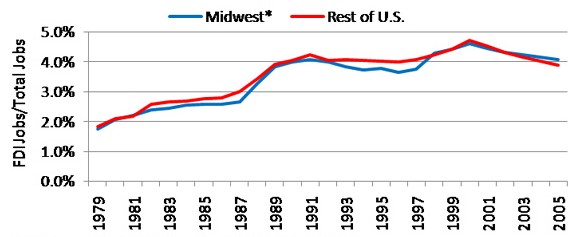Foreign Direct Investment in the Midwest–Update
Americans sometimes harbor mixed feelings about investment in enterprises on U.S. soil that are owned and directed by companies domiciled abroad. Yet for the most part, investment from overseas represents a validation of the productive business climate in the domestic economy. Here, our system of law and contracts, along with productive workers and well-conceived public infrastructure, offer conditions that are conducive to value creation. In turn, foreign direct investment (FDI) activities can benefit our workers and households. New investment and ownership often bring new technology and ideas to American shores, thereby boosting our own growth, wages, and standards of living.
In recent decades, FDI has grown rapidly to comprise a larger share of the U.S. economy. As documented in our recent article, the share of employees working for all companies that are U.S. affiliates (those in which a foreign investor owns at least 10%) grew from 1.8% in 1979 to 4.7% in 2000. According to more recent data, this share has remained fairly constant through the middle of the current decade—now 3.9% by that estimate.
1. FDI employment as percentage of total wage and salary employment

Source: Bureau of Economic Analysis (BEA)
2. Ratio of FDI to gross state product, 2005

Much of recent growth in inbound FDI has resulted from accelerated globalization and rapid world economic growth. Due to a greater ease of communication and lower cost of personal travel and goods shipment, global breadth of enterprises has expanded. General Electric employs 316,000 worldwide, 155,000 outside of the U.S. General Motors employs 335,000 worldwide, 193,000 abroad.
In addition, although the U.S. has maintained its economic prominence in the world economy, the U.S. economy now comprises a smaller share of global production (27% as of 2006). And so, without any countervailing forces, this simple arithmetic would suggest more inbound FDI as a share of the U.S. economy. By one estimate, the U.S. share of global outbound FDI outflows have in fact declined from its 1970 value of 54% of global FDI to 18% in 2006.
While global economic growth is the largest generator of inbound FDI to the U.S., the exchange value of the U.S. dollar versus other currencies can also be influential. The value of the dollar has fallen by 25% since 2002, measured against a basket of currencies weighted by our trade with other countries. For this reason, investment in productive capacity on U.S. soil may look increasingly attractive to foreign-domiciled companies. For one, for those foreign companies that hold their earnings and assets in foreign currencies, the purchase price of physical capital in the U.S. such as real estate, intellectual property, and factories will be cheaper. For companies that now sell into the U.S. market from production facilities abroad, the shifting of production to the U.S. may be advantageous in generating production costs in the same currency as their sales.
Further, for those companies that use their U.S. facilities as a platform from which to export to markets outside of the U.S., earnings on sales will likely be denominated in foreign currency rather than in U.S. dollars. Recent developments in FDI in the U.S. automotive sector may be reflective of these considerations. Several European carmakers are currently considering setting up production in North America, among them Volkswagen and Audi. And exports of U.S.-produced light vehicles have been rising, according to Chicago Fed economist Thomas Klier. From 2002 to 2007, the share of U.S. production that is exported to non-NAFTA countries alone has risen from 3.0% to 11.6%.
In recent years, the state of Indiana has done well by FDI in automotive and other (mostly manufacturing) investments from abroad. The Business Research Center at Indiana University (BRC) has recently issued an extensive report that reviews the global environment for FDI with an emphasis on Indiana and surrounding Midwest states. According to U.S. government data as of 2005, Indiana’s economy ranks 8th in the nation and first in the region as measured by the ratio of FDI to state economic output. (Michigan also exceeds the U.S. average.) As measured by jobs, the United Kingdom and Japan were virtually tied as the number one source of FDI into Indiana, each accounting for 32,000 jobs.
The U.S. government data on FDI for states does not necessarily reflect new investment or added jobs. Rather, most FDI transactions are mergers and acquisitions. For this reason, and because government data are not very timely, the BRC also gathered information from a private vendor on announcements of FDI expansions and new facilities. Since these are announcements rather than completed transactions, we cannot be certain these investments will actually take place. But according to BRC estimates, Indiana will gain nearly 5,000 jobs from 2007 announcements, mostly in the automotive industry. The implication is that Indiana will widen its lead among Midwestern states in the FDI category. An appendix to the BRC report proudly maps the specific FDI projects in which Indiana’s state development agency has completed or participated.
Competing state and local development agencies throughout the Midwest will surely take note.








